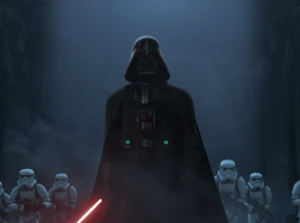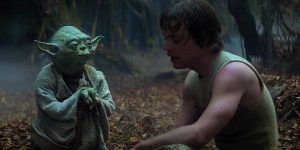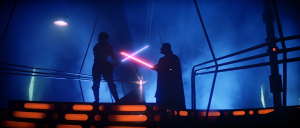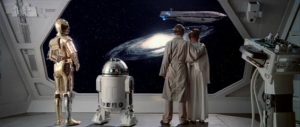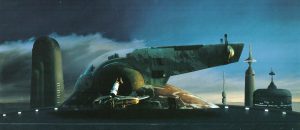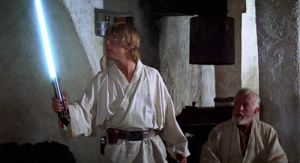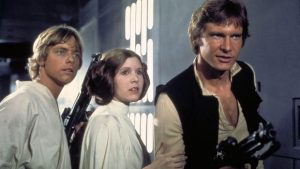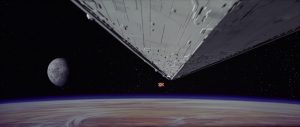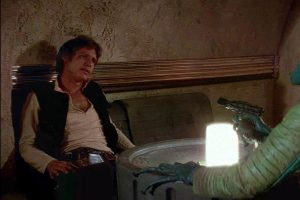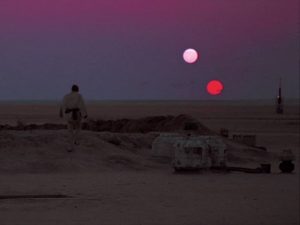We are officially in the last leg of the long journey to Star Wars: The Rise Of Skywalker, which means that the mighty Skywalker Saga, a story spanning forty years across films, books, comics, cartoons and video games is finally coming to a close – which in turn means that it’s time to reflect on that nine-part saga and take a good long look at the films that predate and inform Rise Of Skywalker‘s epic conclusion.
To do that, we’re going to have to discuss spoilers for each of the eight films in the Saga, so…SPOILERS AHEAD.
(Before we begin, be aware that I’m going through the list by order of release date: I understand that George Lucas wanted movies 4, 5 and 6 to be movies 1, 2 and 3 and to be treated as such – but they’re not good enough to warrant that distinction. Sorry, George).
Star Wars: Return Of The Jedi
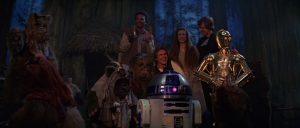
The final chapter in the original Star Wars trilogy sags under the burden placed upon its shoulders by the two previous installments in the Skywalker Saga. Why? Because it follows the same basic principle of The Force Awakens, but without the benefit of coming out some twenty years after the original film – rather than looking like a dreamy, nostalgic callback to former glory, Return Of The Jedi instead feels mostly like a frantic cash-grab, capitalizing on all of A New Hope‘s flashes of ingenuity but ignoring that they cease to be ingenious when repeated time and time again. It doesn’t help the film’s image when you discover that George Lucas rewrote the entire movie to maximize toy sales, something that we’ll discuss in detail.
But first, because I don’t like to be negative about a franchise I love – does Return Of The Jedi have any redeeming qualities?
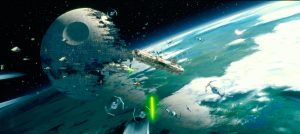
Well, yes. Most films do. Even The Phantom Menace has some good moments (can’t think of any off the top of my head, but I’ll have to think of some for my review of that film). But unfortunately, most of Return Of The Jedi‘s great moments are overshadowed by the larger flaws they contrast. For instance, having Luke Skywalker (Mark Hamill), Darth Vader (voiced by James Earl Jones), and The Emperor (Ian McDiarmid) get in a three-way battle to the death is a great idea, and lends itself nicely to some very cool scenes of action, lightsaber wizardry and Force-lightning madness. However, the fact that this battle takes place on a cheaper, less intimidating knockoff of the Death Star, whose crucial design flaw is basically identical to that on the first Death Star, rendering the object pointless and boring…well, that’s not quite as much fun. If you’re going to reuse old ideas, at least make them bigger and more epic – maybe don’t downgrade from “a weapon the size of a moon that can blow up other planets” to “a partially-constructed weapon the size of a large asteroid that can blow up spaceships one at a time”. Honestly, if you’re going to build a new Death Star, at least have the courtesy to give it to Alec Guinness (who reprised his role as Obi-Wan Kenobi) after you’re done using it, so he can promptly annihilate the entire Star Wars fandom – how he got roped in to doing a third Star Wars film, I have no idea, but it’s evident from his bored, mechanical line-readings that he was doing his level best to make the film unwatchable (apparently, early script drafts had him joining the action as a Force-ghost and helping to defeat The Emperor, but Guinness didn’t like using special effects. You can’t have it both ways, Alec; you’re either an expository ghost or a CGI wizard – there is no middle ground).
Return Of The Jedi is truly disappointing because of how many awesome what-if scenarios were originally going to make their way into the film: scenarios that would have to wait until decades later to be realized onscreen, because George Lucas was afraid that taking risks would minimize the sales of toys, action figures and other Star Wars merchandise. Most shockingly, the trilogy was at one point intended to end with Luke Skywalker removing his father’s mask – and claiming it for himself, having been so corrupted in his fight with The Emperor that he became a Sith Lord, channeling the Dark Side of the Force to turn on the Rebellion, leading to Han Solo’s heroic death during a raid on the Imperial base. Even after Lucas scrapped that idea (it was too sad for a kid’s movie, he claimed), there were still plans for the film to end on a bittersweet note, with Leia in charge of a last, desperate band of Rebels and war-torn heroes, while Luke would abandon the cause and go into hiding. While many of these concepts later found their way into The Force Awakens, they don’t fit particularly well in that film, coming off a trilogy that actually ended triumphantly, with the Empire destroyed, the Jedi supposedly restored to power, and the galaxy at peace. J.J. Abrams’ sequel trilogy is largely founded on an alternative version of Return Of The Jedi that never saw the light of day, a version that allowed for a sequel.
Even Lucas’ film, however, feels like it has multiple parts that belong to a completely different movie. For instance, the thirty-minute long detour on Tatooine to rescue Han Solo (Harrison Ford) might just be an excuse to revisit what is arguably the franchise’s most iconic locale, but it definitely seems to be setting up Solo’s story to actually…go somewhere. But beyond helping to shut down the energy-shields surrounding the Death Star, Solo is largely unimportant to the story. He’s still great, because he’s Han Solo – but why was it so important that we spend half an hour saving him from the clutches of Jabba the Hutt, without any real payoff? Why, unless he was originally intended to do something essential, something heroic – something that would have resulted in his death, and thus fewer toys sold?
This is, unfortunately, the very same trap that J.J. Abrams and his team could fall into with The Rise Of Skywalker. Not with regard to toy sales, I don’t think, but they must similarly feel like ending their trilogy on anything other than a victorious high note would be disappointing after so much buildup. But I sincerely hope they have an incredible plan for the franchise’s climax, and it will be satisfyingly poignant, triumphant and original: if The Lord Of The Rings could end with a decent portion of the main cast setting sail into the West, than so can Star Wars!
There are a couple of characters for whom Return Of The Jedi is not a total mess: Princess Leia (Carrie Fisher), who is finally revealed as Luke Skywalker’s twin sister, and has some strong emotional moments handling the ramifications of that revelation – not to mention more action scenes than she’s ever had before or since, from single-handedly strangling Jabba the Hutt to a crazy speeder-bike chase through the forests of Endor, picking off stormtroopers; C-3PO (Anthony Daniels), who has one hilarious scene in which, mistaken for a deity by the Ewoks of Endor, he ends up nearly condemning Luke, Han and Chewbacca (Peter Mayhew) to become the main course at a sacrificial banquet in his honor, because he’s too polite to refuse; and the oft-quoted Admiral Akbar (Timothy Rose), the Mon Calamari alien who becomes the first high-ranking non-human member of the Rebellion, gets one infamous line of dialogue, and then is seen afterwards partying with the Ewoks. Good for him.
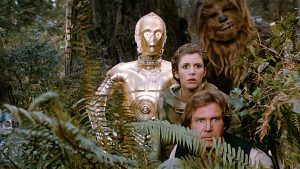
In Return Of The Jedi, George Lucas’ hand once again reaches in from the future to clumsily tinker with the special effects – and here, he has one particularly egregious use of CGI as well as one addition that I have to grudgingly admit is a nice way to keep continuity between all his trilogies. The former is the notorious addition of an entire alien musical number in Jabba’s palace, one which is apparently supposed to make the giant slug’s cavernous lair seem more like a family-friendly dance hall than a den of vice. The latter is the replacement of original Anakin Skywalker actor Sebastian Shaw’s Force-ghost with the likeness of Hayden Christensen, who portrayed Anakin in the prequel trilogy: while that change has always been controversial, I feel it’s actually a nice touch – as are the scenes of celebration in several prequel trilogy planets such as Naboo and Coruscant, lending the victory scene a larger, more epic scale. There’s also a couple of weird little alterations, from giving the Sarlacc a head to digitally shaving off Darth Vader’s eyebrows.
The connection between Darth Vader and Luke Skywalker is the original trilogy’s most powerful element, and the true heart of this story. Luke is faced with many struggles and temptations, and is eventually brought face-to-face with The Emperor (who probably makes a lot more sense if you know who and what he is, thanks to the prequels). Luke’s battle to resist the darkness within him is fiercely compelling. Darth Vader’s redemption might seem to come out of the blue, but it does make sense when viewed in the context of future movies – as Vader watched his son writhe in agony beneath The Emperor’s whips of hellfire, it was impossible for him not to see in his child’s face the tortured eyes of Padmé Amidala, Luke’s mother and the love of Vader’s life – the person for whom he had turned to the Dark Side in a desperate attempt to save her life, only to realize that by doing so, he had actually brought about her anguished, ruinous death. Hearing his son’s pleas and realizing in a blinding flash that The Emperor was solely responsible for all the grievances, betrayals and nightmares visited upon him and his family, Anakin rebelled in that moment, ridding the Skywalkers of The Emperor, who had been their demonic guardian for three generations, giving up his own life to save his and Padmé’s children. It’s powerful stuff. Granted, audiences back in 1983 didn’t know any of that backstory: however, even without the assist of the prequels, you can easily understand and appreciate the poetry of The Emperor being destroyed by his apprentice, just as all Sith are and always have been.
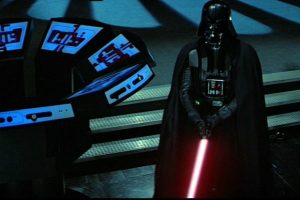
But of course, The Emperor is apparently returning in The Rise Of Skywalker…so does that make Vader’s sacrifice meaningless? Or is it a sign that as long as the Skywalker family exists in the galaxy, The Emperor’s malevolent spirit will haunt them? Probably best not to think about that yet.
In conclusion, Return Of The Jedi is not the best way to cap off a great trilogy, and not a good blueprint for The Rise Of Skywalker to follow – while there may be a handful of redeeming qualities in this movie, most of it is corrupted by the Dark Side of the Force.
Movie Rating: 5.9/10
